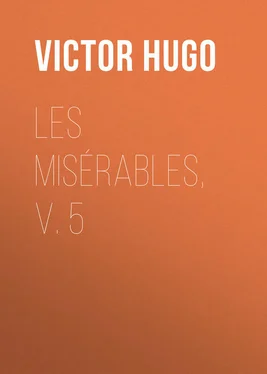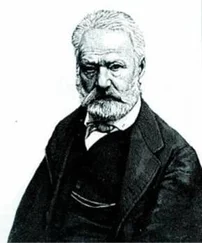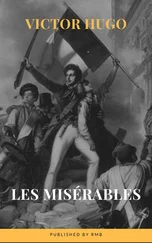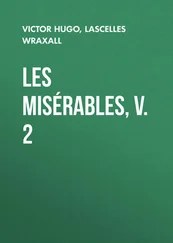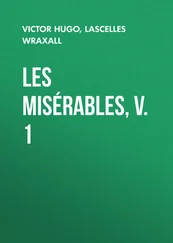Victor Hugo - Les Misérables, v. 5
Здесь есть возможность читать онлайн «Victor Hugo - Les Misérables, v. 5» — ознакомительный отрывок электронной книги совершенно бесплатно, а после прочтения отрывка купить полную версию. В некоторых случаях можно слушать аудио, скачать через торрент в формате fb2 и присутствует краткое содержание. Жанр: literature_19, foreign_antique, foreign_prose, на английском языке. Описание произведения, (предисловие) а так же отзывы посетителей доступны на портале библиотеки ЛибКат.
- Название:Les Misérables, v. 5
- Автор:
- Жанр:
- Год:неизвестен
- ISBN:нет данных
- Рейтинг книги:3 / 5. Голосов: 1
-
Избранное:Добавить в избранное
- Отзывы:
-
Ваша оценка:
- 60
- 1
- 2
- 3
- 4
- 5
Les Misérables, v. 5: краткое содержание, описание и аннотация
Предлагаем к чтению аннотацию, описание, краткое содержание или предисловие (зависит от того, что написал сам автор книги «Les Misérables, v. 5»). Если вы не нашли необходимую информацию о книге — напишите в комментариях, мы постараемся отыскать её.
Les Misérables, v. 5 — читать онлайн ознакомительный отрывок
Ниже представлен текст книги, разбитый по страницам. Система сохранения места последней прочитанной страницы, позволяет с удобством читать онлайн бесплатно книгу «Les Misérables, v. 5», без необходимости каждый раз заново искать на чём Вы остановились. Поставьте закладку, и сможете в любой момент перейти на страницу, на которой закончили чтение.
Интервал:
Закладка:
The abundance of light had something strangely reassuring about it; life, sap, heat, and exhalations overflowed, and the greatness of the source could be felt beneath creation. In all these blasts penetrated with love, in this movement of reflections and gleams, in this prodigious expenditure of beams, and in this indefinite outpouring of fluid gold, the prodigality of the inexhaustible could be felt; and behind this splendor, as behind a curtain of flames, glimpses of God, that millionnaire of the stars, could be caught. Thanks to the sand, there was not a speck of mud; and, thanks to the rain, there was not a grain of dust The bouquets had just performed their ablutions, and all the velvets, all the satins, all the varnish, and all the gold which issue from the earth in the shape of flowers, were irreproachable. This magnificence was clean, and the grand silence of happy nature filled the garden, – a heavenly silence, compatible with a thousand strains of music, the fondling tones from the nests, the buzzing of the swarms, and the palpitations of the wind. All the harmony of the season was blended into a graceful whole, the entrances and exits of spring took place in the desired order, the lilacs were finishing, and the jessamine beginning, a few flowers were behindhand, a few insects before their time, and the vanguard of the red butterflies of June fraternized with the rearguard of the white butterflies of May. The plane-trees were putting on a fresh skin, and the breeze formed undulations in the magnificent enormity of the chest-nut-trees. It was splendid. A veteran from the adjoining barracks who was looking through the railings said, "Spring presents arms in full dress."
All nature was breakfasting; the creation was at table; it was the hour: the great blue cloth was laid in heaven, and the great green one on earth, while the sun gave an à giorno illumination. God was serving His universal meal, and each being had its pasture or its pasty. The wood-pigeon found hempseed, the chaffinch found millet, the goldfinch found chickweed, the redbreast found worms, the bee found flowers, the fly found infusoria, and the greenfinch found flies. They certainly devoured one another to some extent, which is the mystery of evil mingled with good, but not a single animal had an empty stomach. The two poor abandoned boys had got near the great basin, and somewhat confused by all this light, tried to hide themselves, which is the instinct of the poor and the weak in the presence of magnificence, even when it is impersonal, and they kept behind the swan's house. Now and then, at intervals when the wind blew, confused shouts, a rumbling, a sort of tumultuous death-rattle which was musketry, and dull blows which were cannon-shots, could be heard. There was smoke above the roofs in the direction of the markets, and a bell which seemed to be summoning sounded in the distance. The children did not seem to notice the noises, and the younger lad repeated every now and then in a low voice, "I am hungry."
Almost simultaneously with the two boys another couple approached the basin, consisting of a man of about fifty, leading by the hand a boy of six years of age. It was doubtless a father with his son. The younger of the two had a cake in his hand. At this period certain contiguous houses in the Rue Madame and the Rue d'Enfer had keys to the Luxembourg, by which the lodgers could let themselves in when the gates were locked; but this permission has since been withdrawn. This father and son evidently came from one of these houses. The two poor little creatures saw "this gentleman" coming, and hid themselves a little more. He was a citizen, and perhaps the same whom Marius during his love-fever had one day heard near the same great basin counselling his son "to avoid excesses." He had an affable and haughty look, and a mouth which, as it did not close, always smiled. This mechanical smile, produced by too much jaw and too little skin, shows the teeth rather than the soul. The boy with the bitten cake which he had not finished, seemed glutted; the boy was dressed in a National Guard's uniform, on account of the riots, and the father remained in civilian garb for the sake of prudence. Father and son had halted near the great basin, in which the two swans were disporting. This bourgeois appeared to have a special admiration for the swans, and resembled them in the sense that he walked like them. At this moment the swans were swimming, which is their principal talent, and were superb. Had the two little fellows listened, and been of an age to comprehend, they might have overheard the remarks of a serious man; the father was saying to his son, —
"The sage lives contented with little; look at me, my son, I do not care for luxury. You never see me in a coat glistening with gold and precious stones; I leave that false lustre to badly-organized minds."
Here the deep shouts which came from the direction of the Halles broke out, with a redoublement of hells and noise.
"What is that?" the lad asked.
The father replied, —
"That is the saturnalia."
All at once he perceived the two little ragged boys standing motionless behind the swan's green house.
"Here is the beginning," he said.
And after a silence he added, —
"Anarchy enters this garden."
In the mean while the boy bit the cake, spat it out again, and suddenly began crying.
"Why are you crying?" the father asked.
"I am no longer hungry," said the boy.
The father's smile became more marked than ever.
"You need not be hungry to eat a cake."
"I am tired of cake; it is so filling."
"Don't you want any more?"
"No."
The father showed him the swans.
"Throw it to those palmipeds."
The boy hesitated, for if he did not want any more cake that was no reason to give it away.
The father continued, —
"Be humane: you ought to have pity on animals."
And, taking the cake from his son, he threw it into the basin, where it fell rather near the bank. The swans were some distance off, near the centre of the basin, and engaged with some prey: they had seen neither the citizen nor the cake. The citizen, feeling that the cake ran a risk of being lost, and affected by this useless shipwreck, began a telegraphic agitation which eventually attracted the attention of the swans. They noticed something floating on the surface, tacked, like the vessels they are, and came towards the cake slowly, with the majesty that befits white beasts.
"Swans understand signs," said the bourgeois, pleased at his own cleverness.
At this moment the distant tumult of the city was suddenly swollen. This time it was sinister, and there are some puffs of wind which speak more distinctly than others. The one which blew at this moment distinctly brought up the rolling of drums, shouts, platoon fires, and the mournful replies of the tocsin, and the cannon. This coincided with a black cloud which suddenly veiled the sky. The swans had not yet reached the cake.
"Let us go home," the father said; "they are attacking the Tuileries,"
He seized his son's hand again, and then continued, —
"From the Tuileries to the Luxembourg there is only the distance which separates the royalty from the peerage; and that is not far. It is going to rain musketry."
He looked at the cloud, —
"And perhaps we shall have rain of the other sort too; heaven is interfering: the younger branch is condemned. Let us make haste home."
"I should like to see the swans eat the cake," said the boy.
"It would be imprudent," the father answered; and he led away his little bourgeois. The son, regretting the swans, turned his head toward the basin, until a bend in the quincunxes concealed it from him. The two little vagabonds had in the mean while approached the cake simultaneously with the swans. It was floating on the water; the smaller boy looked at the cake; the other looked at the citizen, who was going off. Father and son entered the labyrinth of trees that runs to the grand staircase of the clump of trees in the direction of the Rue Madame. When they were no longer in sight, the elder hurriedly lay down full length on the rounded bank of the basin, and holding by his left hand, while bending over the water, till he all but fell in, he stretched out his switch toward the cake with the other. The swans, seeing the enemy, hastened up, and in hastening their breasts produced an effect useful to the little fisher: the water flowed back in front of the swans, and one of the gentle, concentric undulations slightly impelled the cake toward the boy's switch. When the swans came up, the stick was touching the cake; the lad gave a quick blow, startled the swans, seized the cake, and arose. The cake was soaking, but they were hungry and thirsty. The elder boy divided the cake into two parts, a large one and a small one, kept the small one for himself, and gave the larger piece to his brother, saying, —
Читать дальшеИнтервал:
Закладка:
Похожие книги на «Les Misérables, v. 5»
Представляем Вашему вниманию похожие книги на «Les Misérables, v. 5» списком для выбора. Мы отобрали схожую по названию и смыслу литературу в надежде предоставить читателям больше вариантов отыскать новые, интересные, ещё непрочитанные произведения.
Обсуждение, отзывы о книге «Les Misérables, v. 5» и просто собственные мнения читателей. Оставьте ваши комментарии, напишите, что Вы думаете о произведении, его смысле или главных героях. Укажите что конкретно понравилось, а что нет, и почему Вы так считаете.
